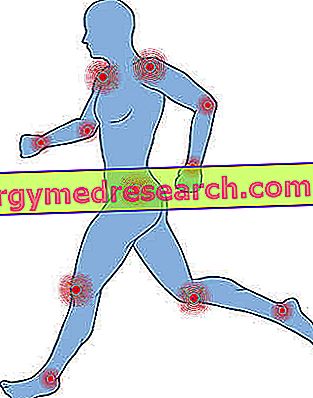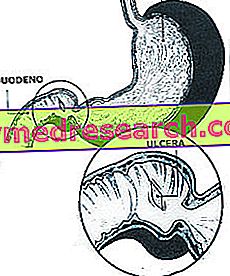Introduction and generalities
The safeguarding of joint health is guaranteed by the characteristic mechanical properties of cartilage, capable of promoting the movement of the articular heads, reducing frictions to a minimum and all possible mechanical stresses.

The biosynthetic activity of these cells, in association with the normal turn-over of the macromolecules present in the matrix, defines the ultrastructural and functional characteristics of the cartilage.
Collagen is certainly one of the most important macromolecules.
Collagen
The term collagen identifies a family of proteins characterized by a triple helix structure, whose structural unit is represented by the tropocollagen .
The tropocollagen is a protein which in turn consists of 3 polypepetidic chains, with a constant amino acid sequence Glycine X Proline or Glycine X Hydroxyproline, organized in a triple right-handed helix.
The very special three-dimensional rearrangement gives collagen the known chemical-physical properties.
Currently, 26 different types of collagen have been identified, although only a few, around 6-8, are then present in significant quantities in the extracellular matrix and, in particular, at the articular and cartilaginous level.
The turnover of collagen, which evidently significantly affects the histological and functional properties of the cartilage, is controlled by:
- The normal half-life of collagen;
- The availability of starting substrates for synthesis;
- The presence of inflammatory stimuli that accelerate their degradation and alter their normal structure;
- The state of health of chondrocytes and fibroblasts, cells responsible for the synthesis of these proteins;
- The presence of particular pathological conditions both of local and systemic nature.
An altered turn-over of the collagen component is often the cause and consequence of pathologies and degenerative conditions of the joints, such as osteoarthritis and osteoarthritis.
Collagen supplements
By virtue of the extremely important role of collagen in maintaining adequate joint health, collagen-based supplements have been commercially widespread for the past several years.
Initially extracted from bovine achilles tendon, the use of bovine collagen, due to the increased risk of infectious diseases such as BSE, has been gradually replaced with that of an equine nature.
Currently there are procedures capable of extracting collagen also from fish and vegetable products, thus minimizing the risk of potential infectious pathologies, as well as of possible allergic manifestations linked to the high antigenicity of this protein.
The study of the pharmacokinetic properties and the enormous progress made by pharmaceutical technology have facilitated over time the development of techniques of chemical manipulation of collagen.
From these developments hydrolyzed collagen was born, obtained by controlled hydrolysis of native collagen, which is more effective than this last one because:
- Of the best intestinal absorption profile;
- Of the best gastrointestinal tolerability;
- Of the lower allergenicity;
- Of greater bioavailability.
Collagen supplements for healthy joints
With the progressive aging of the population, the incidence of pathologies and joint disorders has grown exponentially.
At the same time, the relentless use of various types of anti-inflammatory drugs and cortisone drugs has constituted and still constitutes the most widely used intervention strategy, with all the risks for the patient's general state of health.
In order to control the use and abuse of drugs and offer an effective alternative remedy - able both to correct the joint problem, where possible, but above all to prevent it - the use of various supplements has spread, among which precisely the collagen.
Although the scientific literature is still not entirely in agreement, the use of collagen, especially in some pathological joint conditions, would have proved effective in preventing joint complications, while improving the present clinical picture.
In this regard the use of collagen:
- It would have improved the health status and quality of life of patients suffering from osteoarthritis;
- It would have helped to reduce the amount of joint pain present in the spine;
- It would contribute, also in association with drug therapy, to improving joint mobility and the rate of physical activity in patients suffering from osteoarthritis;
- It would help prevent and improve the onset of joint pain in athletes subjected to intense training, thus having direct repercussions on the performance state;
- It would allow an improvement in pain in the temporomandibular joint to be recorded in patients with fibromyalgia.
Making the use of collagen slightly more complex in orthopedic or preventive settings is the absence of well-defined dosages and reproducible administration protocols.
However, excellent results would seem to derive from the simultaneous intake of Collagen and other molecules with antioxidant and protective properties, such as hyaluronic acid, vitamin C, chondroitin and glucosamine.

Anti-age Collagen Supplement X115 + Plus
New generation anti-aging supplement. Double Day & Night formulation with high concentration of assets; supports and optimizes antioxidant defenses and stimulates the synthesis of collagen, hyaluronic acid and elastin, protecting the health of the joints and the future beauty of the skin . " More information "
Bibliography
A double-blind, placebo-controlled, randomized, clinical study on the effectiveness of collagen peptide on osteoarthritis.
Kumar S, Sugihara F, Suzuki K, Inoue N, Venkateswarathirukumara S.
J Sci Agric Food 2015 Mar 15; 95 (4): 702-7
A double-blind, placebo-controlled, randomized, clinical study on the effectiveness of collagen peptide on osteoarthritis.
Kumar S, Sugihara F, Suzuki K, Inoue N, Venkateswarathirukumara S.
J Sci Agric Food 2015 Mar 15; 95 (4): 702-7
A double-blind, placebo-controlled, randomized, clinical study on the effectiveness of collagen peptide on osteoarthritis.
Kumar S, Sugihara F, Suzuki K, Inoue N, Venkateswarathirukumara S.
J Sci Agric Food 2015 Mar 15; 95 (4): 702-7
24-Week study on the use of collagen hydrolysate as a dietary supplement in athletes with activity-related joint pain.
Clark KL, Sebastianelli W, Flechsenhar KR, Aukermann DF, Meza F, Millard RL, Deitch JR, Sherbondy PS, Albert A.
Curr Med Res Opin. 2008 May; 24 (5): 1485-96
The effects of collagen hydrolysis on symptoms of chronic fibromyalgia and temporomandibular joint pain.
Olson GB, Savage S, Olson J.
Skull. 2000 Apr; 18 (2): 135-41.
Collagen hydrolysate for the treatment of osteoarthritis and other joint disorders: a review of the literature.
Bello AE, Oesser S.
Curr Med Res Opin. 2006 Nov; 22 (11): 2221-32
Changes in content and synthesis of collagen types and proteoglycans in osteoarthritis of the knee joint and comparison of quantitative analysis with Photoshop-based image analysis.
Lahm A, Mrosek E, Spank H, Erggelet C, Kasch R, Esser J, Merk H.
Arch Orthop Trauma Surg. 2010 Apr; 130 (4): 557-64.



